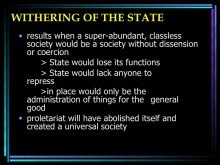Marx and Engels were not Utopian Socialists: that Is, they had no pre-imagined blueprint of what a socialist society would actually look like. Consequently, they wrote little on the subject. But Engels coined a term– “the withering away of the state” –to describe a process of administration shedding its coercive power under the temporary structure of a workers` state.
It is, then, quite bizarre to find that the party most associated with any current withering away of the state is the Tory Party. The main difference with Engels being that the “withering” is of all parts of the state except its coercive apparatus. This raises several questions: Can capitalism exist without the state? What does the “state” consist of? And should socialists argue for a more powerful, or a weaker, state?
Marx e modern state is nothing but a committee for managing the common affairs of the whole bourgeoisie”). It had originated as “bodies of armed men”, as Lenin later described it in `The State & Revolution`, employed by princes and priests to safeguard surplus stocks of food in aductive system that produced enough to enrich a few, but not enough to enrich all. This stratification was the birth of the class system, accompanied by division and repression. Ritual and religious rites enshrined the naked theft as something ordained and “natural”. There is, however, evidence (in Turkey) of violent sweeping away of both class, and classless, societies; there was clearly some resistance [re: Çatalhöyük].
With the increasing sophistication of productive forces came the increasing sophistication of the state. Trade, commerce and competition took it beyond the mere protection warehouses and local warlords! If a peasant dies young, it matters little to the ruling class–s/he is easily and cheaply replaced. However, the replacement costs for a skilled engineer are much higher! It makes economic sense to extend his (largely his, at this point in time) productive life through the development of state medical services. But the core of the state remains the same: the extraction of productive labour (profits) by force, be that force actual slavery, or wage slavery.
Here, of course, we have a problem, since most of the Left, over most of its history, has argued for the widening of the apparatus of the state and for the broadening of its field of responsibility, into infrastructure, health, social care and welfare. It is the political Right (helped, on occasions, by Right-wing social democrats) that has argued for, and created, the privatisation of previously state functions. Indeed, this process is ongoing!
The state is critical for the capitalist system. It is the ultimate guarantor of profit. Whether in colonial adventures, quelling civil disturbance or facing down “foreign” competitors, the “special bodies of armed men”, and its support apparatus, is just as relevant today as in Marx’s time. However, not ALL of the state is equally relevant. We have “democracy” (of a kind), a welfare state (much savaged) and certain liberal reforms (however limited) because, at a certain point in time, such add-ons to the state were deemed necessary: to co-opt opposition, avert revolution or overcome widespread resistance. They fulfil the same role that the rituals and religious rites did in pre-history! They are NOT an essential part of the state.
What these Add-ons have done is to shift the whole terms of class engagement, of class struggle, onto terrain more favourable to the ruling class. Thus the argument becomes centred on the improvement of the conditions of the prisoner, NOT his/her ultimate release. The cage has become gilded, in the sense that its captives cannot conceive of any life outside it. The problem is not the desire for better conditions, but the highly conditional ability of the jailors to deliver them. Better conditions are clearly available outside the cage, but only if the jailors give up their position of privilege. Currently, this is not even on the table! Consequently, the only way in which reforms make sense is as part of a longer term strategy to show the prisoner that the only way to achieve the reforms is to break loose of the prison. That is, to challenge the entire system in a revolutionary way.
It is a double irony that the Tories are attacking the state (mainly its welfare component) to make it more repressive, whilst the revolutionary left is defending it, the better to suppress its coercive functions and abolish it in the long term. It is important that the social component is brought to the front, to acknowledge that, for example, that nationalisation has nothing to do with socialism unless it is also socialised: put under control of workers and users.
Unfortunately, a large part of the Left is defending the state under the illusion that it is capable of reform. It is not, as it has demonstrated when it feels threatened. The capitalist state has happily co-existed with fascism (the electrics in the labour camps were installed by Siemans, the gas was made by E G Farben, Texaco supplied Franco with fuel throughout the civil war etc etc). The one thing it cannot live with is socialism. Real socialism. The sooner socialists realise that better gilding just makes the cage prettier, unless you use better conditions to organise the prison escape, the better. The world’s poor and ill, the oppressed and, indeed, the planet itself are waiting for a convincing plan of escape. The ultimate reform is revolution.
Tim Nicholls
THE DURRUTI COLUMN
A Monthly Column from DORSET SOCIALISTS







